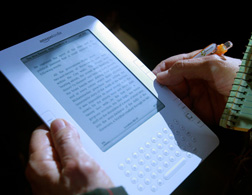Kathy Sierra,author, game programmer and interaction designer for places like Virgin and MGM, knows how to get things done. She is the co-creator of the Head First series of books on technical (primarily computer) topics, along with her partner, Bert Bates. The series, which began with Head First Java in 2003, takes an unorthodox, visually intensive approach to the process of teaching programming. Sierra's books in the series have received three nominations for Product Excellence Jolt Awards, winning in 2005 for Head First Design Patterns, and were recognized on Amazon.com's yearly top 10 list for computer books from 2003 to 2005. Here are her 16 steps for making breakthroughs happen faster for your organization...and yourself.
1)
Decide what powers you want to give your users. Now imagine that superpower on a shirt and let it guide you in all your decisions
2)
Play the superset game. If you're deciding what to do with your company, look at what you do, and the larger movement that you're a part of. Always focus on that bigger, cooler thing. Like, blogging about your kitchen equipment company is not necessarily the most interesting topic for your readers, but blogging about new approaches to cooking is.
3)
Learn the patterns and shorten the duration to greatness. It takes 10,000 hours to be amazing, according to the Malcolm Gladwell book
Outliers: The Story of Success. So you have to cheat by multi-tasking and focusing on your strengths.
4)
Participate in deliberate practice. Find ways to add games and incentives to get towards small, completed goals together. This means kicking ass in less than 1000 hours. Create situations like
48 hour film festivals, where filmmakers have to walk away with a completed film in 48 hours.
5)
Make the right things easy and the wrong things hard. Put things that need your attention front and center. It's not in the corner because you don't use it, you don't use it because it's in the corner.
6)
Get better gear, and offer it to your users. Money spent on new and better equipment that helps you kick ass in a major way is always worth the money. If you work on a computer all day, it has been proven: More monitors will help you see more pixels and will aid your productivity.
7)
Be clueless. What would it be like if you didn't know how it was supposed to be? Play dumb.
8)
Participate in total immersion jams. Meet regularly with other people who do what you do and share practices. The frequency of how much you do it always affects how well you learn.
9)
Don't make a better X, make a better user of X.
10)
Decide what movie your users are in. And find out what movie they'd rather be in. Include all the characters, the heroes and mentors and the villains. And don't forget the soundtrack.
11)
Don't ask your users. If you want incremental improvements ask your users. If you want to make breakthroughs, ignore everybody. And ask other people's (ahem, the competition's) users.
12)
Be brave. Don't shy away from things that are difficult and challenging for your users, or tasks that reward them for thinking.
13)
Don't ignore things that people say are dead. Dead industries are sometimes the best places to look for new ideas.
14)
Use a stereo EQ as a model for your business. Adjust the sliders to create market differentiation, but don't forget to create new sliders. She brings another SXSW legend, bubbly Gary Vaynerchuk of
Wine Library TV onstage to illustrate this point, whose highly-entertaining internet wine show added sliders of Accessibility and Enthusiasm to the wine industry, and took away the sliders of Elitism and Stodginess.
15)
Don’t mistake narrow for shallow. She points at hyper-focused blogs like
Passive Aggressive Notes and the
"Blog" of "Unnecessary" Quotation Marks as mastering a very tiny sliver of the internet.
16)
Be amazed. It's not easy in this economic climate. She plays a clip of
comic Louis CK appearing on Conan, which got the entire audience roaring. Give it a watch if you've forgotten to be amazed today.
Found at Fast Company





































 - arXiv, PubMedCentral & IngentaConnect
- arXiv, PubMedCentral & IngentaConnect

